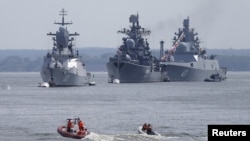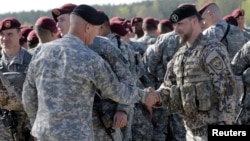Russia says it will deploy three divisions of troops along its borders to counter NATO's increasing military presence in Eastern Europe.
Defense Minister Sergei Shoigu said Wednesday after a meeting in Moscow that the new divisions will be stationed along Russia’s western and southern borders.
"The Defense Ministry is taking a series of measures aimed at countering the buildup of NATO forces in close proximity to Russian borders. By the end of the year, two new military divisions will be formed in the Western Military district and one in the Southern Military District. At the moment, facilities construction is being carried out at the sites where these units will be deployed," he said.
Shoigu gave no details about the size and timing of the new Russian deployment, or where the troops would be stationed. He first mentioned the plan to create three new divisions back in January, and Russian media reports at the time estimated up to 30,000 troops would be involved.
NATO looking at additional troop boost
U.S. Secretary of Defense Ash Carter said this week that NATO is considering stationing a force of around 4,000 troops in Poland and the three Baltic states - Lithuania, Latvia and Estonia - all of which are members of the western alliance. This would be in addition to another deployment already authorized - a U.S. armored brigade, about 4,200 troops, that will be sent to eastern Europe in February.
Carter said Monday that the additional eastern-Europe force NATO is considering would consist of four battalions of soldiers, contributed by NATO members on a "continuously rotating" basis.
Another senior Russian Defense Ministry official, Andrei Kelin, said Wednesday that dispatching four additional NATO battalions to the Baltic states and Poland would amount to "a very dangerous build-up of armed forces pretty close to our borders," Interfax news agency reported.
Worries over Russian posturing
The United States and other governments in both Western and Eastern Europe have been increasingly concerned by Russia's military moves since 2014, when it annexed Ukraine's Crimea region. Estonia, Latvia and Lithuania have been particularly anxious about what they see as aggressive posturing by Russia, and all three have asked NATO to expand its presence in the Baltics as a deterrent to Russia.
Russian military moves in recent weeks have included flight maneuvers by Russian jets that simulated attacks on a U.S. warship in the Baltic Sea, and an interceptions by Russian warplanes of U.S. reconnaissance planes flying over international waters. Despite tensions created by the incidents, Moscow has rejected protests by American authorities, and denied U.S. claims its pilots' actions were reckless and dangerous.
The Kremlin has repeatedly disavowed any plan to intervene militarily in the Baltic states which, formerly part of the Soviet Union, were for decades under Moscow’s rule.





